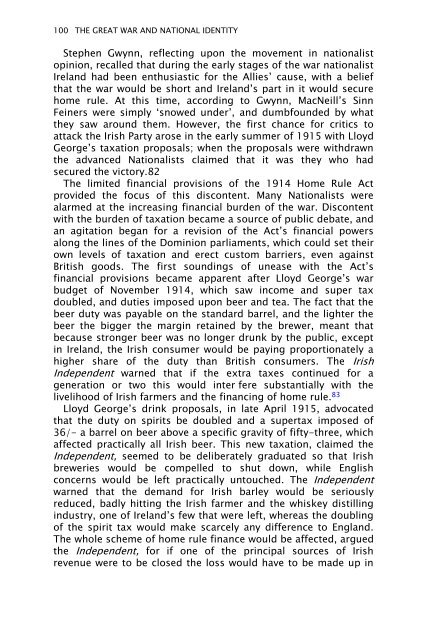Dividing Ireland: World War I and Partition
Dividing Ireland: World War I and Partition
Dividing Ireland: World War I and Partition
Create successful ePaper yourself
Turn your PDF publications into a flip-book with our unique Google optimized e-Paper software.
100 THE GREAT WAR AND NATIONAL IDENTITY<br />
Stephen Gwynn, reflecting upon the movement in nationalist<br />
opinion, recalled that during the early stages of the war nationalist<br />
<strong>Irel<strong>and</strong></strong> had been enthusiastic for the Allies’ cause, with a belief<br />
that the war would be short <strong>and</strong> <strong>Irel<strong>and</strong></strong>’s part in it would secure<br />
home rule. At this time, according to Gwynn, MacNeill’s Sinn<br />
Feiners were simply ‘snowed under’, <strong>and</strong> dumbfounded by what<br />
they saw around them. However, the first chance for critics to<br />
attack the Irish Party arose in the early summer of 1915 with Lloyd<br />
George’s taxation proposals; when the proposals were withdrawn<br />
the advanced Nationalists claimed that it was they who had<br />
secured the victory.82<br />
The limited financial provisions of the 1914 Home Rule Act<br />
provided the focus of this discontent. Many Nationalists were<br />
alarmed at the increasing financial burden of the war. Discontent<br />
with the burden of taxation became a source of public debate, <strong>and</strong><br />
an agitation began for a revision of the Act’s financial powers<br />
along the lines of the Dominion parliaments, which could set their<br />
own levels of taxation <strong>and</strong> erect custom barriers, even against<br />
British goods. The first soundings of unease with the Act’s<br />
financial provisions became apparent after Lloyd George’s war<br />
budget of November 1914, which saw income <strong>and</strong> super tax<br />
doubled, <strong>and</strong> duties imposed upon beer <strong>and</strong> tea. The fact that the<br />
beer duty was payable on the st<strong>and</strong>ard barrel, <strong>and</strong> the lighter the<br />
beer the bigger the margin retained by the brewer, meant that<br />
because stronger beer was no longer drunk by the public, except<br />
in <strong>Irel<strong>and</strong></strong>, the Irish consumer would be paying proportionately a<br />
higher share of the duty than British consumers. The Irish<br />
Independent warned that if the extra taxes continued for a<br />
generation or two this would inter fere substantially with the<br />
livelihood of Irish farmers <strong>and</strong> the financing of home rule. 83<br />
Lloyd George’s drink proposals, in late April 1915, advocated<br />
that the duty on spirits be doubled <strong>and</strong> a supertax imposed of<br />
36/- a barrel on beer above a specific gravity of fifty-three, which<br />
affected practically all Irish beer. This new taxation, claimed the<br />
Independent, seemed to be deliberately graduated so that Irish<br />
breweries would be compelled to shut down, while English<br />
concerns would be left practically untouched. The Independent<br />
warned that the dem<strong>and</strong> for Irish barley would be seriously<br />
reduced, badly hitting the Irish farmer <strong>and</strong> the whiskey distilling<br />
industry, one of <strong>Irel<strong>and</strong></strong>’s few that were left, whereas the doubling<br />
of the spirit tax would make scarcely any difference to Engl<strong>and</strong>.<br />
The whole scheme of home rule finance would be affected, argued<br />
the Independent, for if one of the principal sources of Irish<br />
revenue were to be closed the loss would have to be made up in








